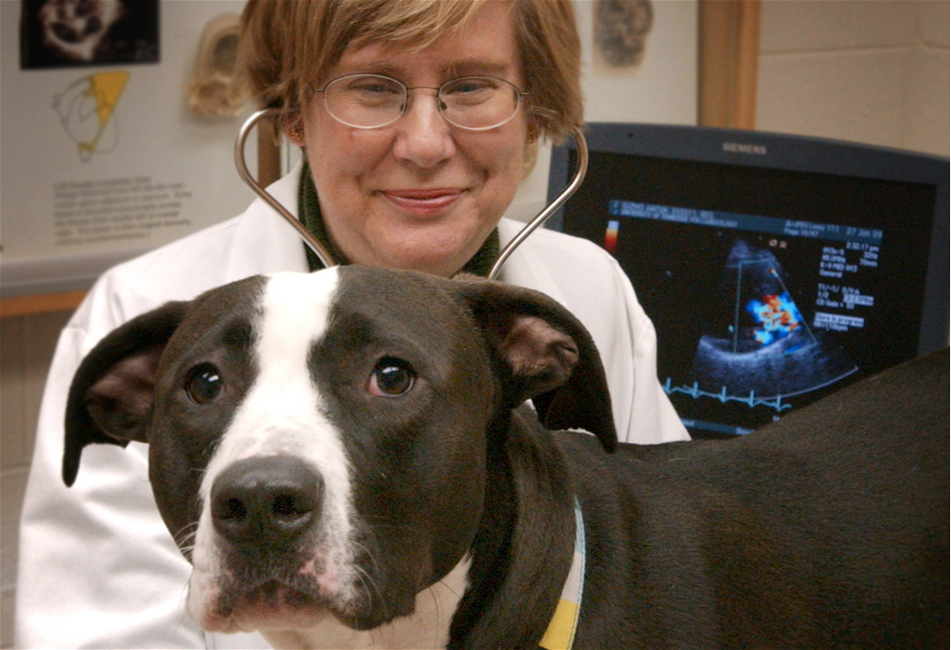Discovering the Important Solutions Offered by a Vet Cardiologist: Understanding Ultrasound and CT Scan Methods
Vet cardiologists play an important function in the health and wellness of family pets by diagnosing and treating different heart disease. They make use of advanced imaging strategies, such as heart ultrasound and CT scans, to provide precise examinations. Each approach has its distinct advantages and applications. Recognizing these methods is essential for animal owners seeking the very best treatment for their friends. What factors should pet dog proprietors consider when selecting between these diagnostic tools?

The Duty of Veterinary Cardiologists in Family Pet Medical Care
Veterinary cardiologists play a crucial duty in the healthcare of family pets, concentrating specifically on diagnosing and dealing with heart-related problems. They have specialized training that allows them to interpret complicated analysis examinations and identify various cardiovascular issues. These specialists utilize advanced methods, such as echocardiography and electrocardiography, to examine heart feature and framework accurately.Veterinary cardiologists additionally develop tailored treatment plans that may include medicines, way of living alterations, and, in some cases, surgical interventions. Their know-how includes enlightening pet dog proprietors concerning heart wellness, stressing the relevance of normal exams and very early discovery of prospective issues. Partnership with general veterinarians is vital, as it guarantees comprehensive take care of pets with suspected heart concerns. By supplying specialized solutions, veterinary cardiologists significantly enhance the high quality of life for animals and offer satisfaction for their owners, enhancing the relevance of heart wellness in general animal wellness.
Usual Cardiac Issues in Pet Dogs
Typical cardiac concerns in pet dogs can considerably impact their health and top quality of life. Heart murmurs, numerous sorts of cardiomyopathy, and congenital heart issues are amongst the most widespread problems that veterinarians run into. Board Certified Veterinary Cardiologist. Understanding these issues is important for pet proprietors to ensure prompt medical diagnosis and appropriate therapy
Heart Murmurs in Pets
Although heart whisperings can be a source of worry for pet owners, they are not always a sign of major health problems. A heart whispering is an abnormal noise generated by turbulent blood flow within the heart. In family pets, these whisperings can be triggered by different aspects, consisting of congenital heart defects, shutoff problems, or also stress during assessments. Several animals with heart murmurs lead typical lives without considerable wellness influences. To determine the underlying cause, veterinary cardiologists commonly use analysis strategies such as echocardiograms and Doppler ultrasounds. Early discovery and assessment are important, as they may help manage any prospective cardiac issues efficiently. Animal owners are encouraged to consult their veterinarian for a complete examination if a heart whispering is identified.
Cardiomyopathy Types Explained
Cardiomyopathy incorporates a team of conditions influencing the heart muscular tissue, bring about endangered heart feature in family pets. One of the most usual types include expanded cardiomyopathy (DCM), hypertrophic cardiomyopathy (HCM), and limiting cardiomyopathy (RCM) DCM mostly impacts canines, causing the heart to weaken and increase the size of, which reduces its capability to pump blood effectively. On the other hand, HCM is extra common in cats, characterized by the enlarging of the heart walls, frequently causing obstructed blood flow. RCM, though much less common, takes place when the heart muscle mass becomes inflexible, limiting its capacity to full of blood. Each type offers special challenges in medical diagnosis and treatment, demanding specialized veterinary cardiological analysis to ensure peak monitoring and look after affected family pets.
Congenital Heart Defects
Genetic heart issues stand for a substantial classification of cardiac concerns in animals, unique from acquired problems such as cardiomyopathy - CT Scans For Dogs. These issues are structural irregularities existing at birth, affecting the heart's typical feature. Common types consist of license ductus arteriosus, ventricular septal defects, and pulmonic stenosis. Signs and symptoms might vary commonly, varying from moderate to extreme, and can consist of exercise intolerance, coughing, and problem breathing. Early medical diagnosis via innovative imaging techniques like ultrasound is necessary for reliable management. Veterinary cardiologists play an essential function in recognizing these problems and advising appropriate treatment options, which may include medical administration or medical treatment. Identifying genetic heart issues allows for better outcomes and enhanced quality of life for affected animals
Comprehending Cardiac Ultrasound: How It Works
A significant number of veterinary practices currently make use of heart ultrasound as an essential analysis device for evaluating heart health click this link in animals. This non-invasive strategy makes use of high-frequency acoustic waves to develop photos of the heart's structure and function. Throughout the treatment, a vet professional uses a gel to the pet's breast and uses a transducer to emit ultrasound waves. These waves jump off the heart and bordering frameworks, generating real-time images on a monitor.Veterinarians can assess various facets of heart health and wellness, including chamber size, wall surface movement, and valve feature. In addition, cardiac ultrasound allows for the discovery of problems such as liquid build-up and congenital heart defects. This strategy is crucial for diagnosing problems that may not be noticeable with basic radiographs. By providing thorough info about the heart's composition and performance, cardiac ultrasound help in developing reliable treatment strategies for animals struggling with cardiovascular disease.
The Value of CT Scans in Identifying Heart Issues
How do CT scans improve the medical diagnosis of heart disease in vet medication? CT scans supply thorough cross-sectional photos of the heart and bordering frameworks, allowing veterinarians to envision complex anatomical partnerships. This imaging strategy is specifically beneficial in determining genetic heart defects, cardiac growths, and problems in capillary. By utilizing advanced imaging algorithms, CT scans can examine heart chamber dimensions and feature, why not find out more offering a complete sight that might be difficult to achieve with conventional methods.Additionally, CT angiography can picture blood circulation and recognize locations of constriction or blockage, which is important for preparing prospective interventions. The speed and precision of CT scans also help with quick diagnoses, important in emergency circumstances. Eventually, the consolidation of CT scans into veterinary cardiology significantly enhances the accuracy of medical diagnoses, enabling targeted therapy strategies and enhancing individual end results for pets struggling with heart disease.
Contrasting Ultrasound and CT Check Methods
While both ultrasound and CT scans are vital devices in veterinary cardiology, they provide distinct advantages and limitations that affect their usage in identifying heart disease. Ultrasound, or echocardiography, provides real-time imaging of the heart's structure and feature, enabling veterinarians to assess heart chambers, shutoffs, and blood circulation. It is especially effective for evaluating problems like heart disease and cardiomyopathy. Ultrasound might be restricted in visualizing particular anatomical frameworks due to person size or obesity.In comparison, CT scans offer detailed cross-sectional pictures of the heart and surrounding tissues, making them perfect for recognizing structural problems, tumors, or vascular problems. Although CT scans offer detailed insights, they require sedation and might entail radiation exposure. Inevitably, the choice between ultrasound and CT scans relies on the specific medical circumstance, the client's problem, and the info needed for you can try this out an accurate medical diagnosis.
Treatment Choices Readily Available Through Veterinary Cardiology
Veterinary cardiology provides an array of therapy alternatives customized to address different heart disease in pets. Therapy strategies often begin with lifestyle modifications, including diet modifications and exercise modifications, focused on enhancing general heart health and wellness. Medicines play a crucial function, with cardiologists recommending medications such as diuretics, beta-blockers, and ACE inhibitors to enhance and manage symptoms heart function.In extra extreme situations, interventional procedures, such as balloon valvuloplasty or stent placement, may be necessary to alleviate blockages or boost blood circulation. For sure hereditary heart problems, surgical alternatives might be explored to correct architectural concerns. Furthermore, continuous monitoring and follow-up treatment are crucial elements of a detailed therapy plan, enabling prompt adjustments based upon the family pet's reaction to treatment. Generally, veterinary cardiology concentrates on supplying efficient, individualized treatment to enhance the health and health of pet clients with heart disease.
Just how to Prepare Your Animal for a Cardiac Assessment
Preparing a pet for a heart assessment is important to assure precise outcomes and a smooth process. Owners should initially set up the visit with the vet cardiologist and talk about any kind of specific demands or concerns. It is a good idea to withhold food for a minimum of 12 hours before the evaluation, as this assists boost imaging quality during treatments like ultrasound or CT scans.Additionally, keeping a calm atmosphere on the day of the consultation can assist lower the animal's anxiousness. It is advantageous to bring along any type of pertinent medical records, including previous tests and medicines (Board Certified Veterinary Cardiologist). Owners need to additionally make certain that their pet fits and leashed throughout transport to the center. Acquainting themselves with the analysis procedure can alleviate worries and aid in asking informed inquiries throughout the appointment. By following these steps, owners can contribute considerably to the performance of the heart examination
Often Asked Concerns
Just how Lengthy Does a Heart Ultrasound or CT Scan Take?
The duration of a cardiac ultrasound usually varies from 30 to 60 minutes, while a CT check might take approximately 15 to 30 minutes. Aspects such as the person's problem can affect these time estimates.

Exist Any Kind Of Dangers Connected With These Diagnostic Treatments?

Can I Stay With My Animal During the Treatment?
The vet facility's policy generally dictates whether pet dog proprietors can stay during treatments. While some centers encourage proprietor visibility for comfort, others may call for splitting up to ensure safety and ideal problems for analysis imaging.
Just how much Do These Diagnostic Examinations Usually Cost?
The prices of analysis tests, such as ultrasound and CT scans, usually vary based upon place and center. Normally, prices vary from a few hundred to over a thousand bucks, mirroring the complexity and technology included.
What Is the Recovery Refine After a Cardiac Examination?
The recovery process after a heart assessment entails keeping an eye on the pet for any kind of immediate responses, ensuring convenience, and restricting physical activity. Vets generally give post-evaluation directions to lead pet proprietors throughout this vital recuperation period. Heart murmurs, numerous kinds of cardiomyopathy, and congenital heart flaws are amongst the most common problems that vets experience. A heart whispering is an abnormal sound generated by turbulent blood flow within the heart. Cardiomyopathy incorporates a team of diseases affecting the heart muscle mass, leading to endangered cardiac feature in pet dogs. Genetic heart defects represent a significant classification of heart concerns in pets, distinct from acquired conditions such as cardiomyopathy. Ultrasound, or echocardiography, supplies real-time imaging of the heart's framework and feature, permitting vets to analyze heart chambers, shutoffs, and blood circulation.